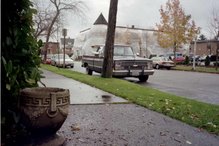Louise's War by Sarah R. Shaber. - discussed by Books at Twelve Ten volunteers. (After our discussion we chose David Guterson's Snow Falling on Cedars for February 14th.)
1. A New Year, Rain
Only one other book club volunteer attended the January Books At Twelve Ten. Presently we meet in an area of the curved far wall of the Olympic Room, open a couple of windowshades to a small view of historic outer stairwell, time-worn steps with a restored pipe metal hand rail. The room is at the upper side of a hill, at the back of the first floor of the Carnegie Library, a hundred years old in 2005.
Earlier in January there was rain. I raced through a downpour in my yellow poncho from the transit center to the mall entrance the day I replaced my wristwatch battery. That purchase question converged with thoughts of telephones - lots of people get the time off their cel phones now. One store employee explained that senior cel phones started at age 65. So many senior opportunities start as early as 55. Just inside the mall I blotted rain off my shoes with a bandana.
2. A New Year, A New Book
At the Olympic Room Tuesday the weather forecast was for a day of clouds, colder temperatures without rain. Our weather view at the outer stairwell was permeated damp.
Louise's War was published in 2011and is narrated in the first person by character Louise Pearlie, a World War Two era office worker with the OSS, the precurser to the CIA. In a preface the author Sarah R. Shaber asks the reader to accept the use of language used years ago before the Civil Rights Movement. The
The other volunteer and I worked through the questions. At #3 (How does race and class play a role in the lives of the characters?) I mentioned that, at Louise's boarding house in
Seventy years have passed. The focus for Louise on race involves "Negroes", but also the fact that a college classmate from years earlier is held in France, her husband in the underground, and they are Jewish.
The other volunteer said that new opportunity for women led Louise to follow up on her college friendship and become a detective. I agreed and said activities were within the job definition, but that she was taking responsibilities that were new. We follow Louise's thoughts within this evolution. Both of us volunteers liked this theme very much.
3. Setting and Earlier Series Theme - Person of Size
The boarding house and office settings were convincing to me. At one point Louise ventures much farther away in the city to a castle-like embassy building. When Louise must crawl out a window and scramble down a wall with a grip on ivy, the author has not prepared me for her circus performer action.
However, I reflect that this physical challenge may compare to the barrier Lousie breaks in the kitchen, and compare to the office behavior evolution. But because I have read the Simon Shaw series I wonder if the physical capability question is affected by the question of personal size. The murder victim in Louise's War happened to be a person of size, an overweight man.
Person of Size identity was a previous theme. In the earlier series, the detective was a rather small man, a marginal Person of Size. Shaber's earlier series of mysteries explored questions of small minority groups in


No comments:
Post a Comment